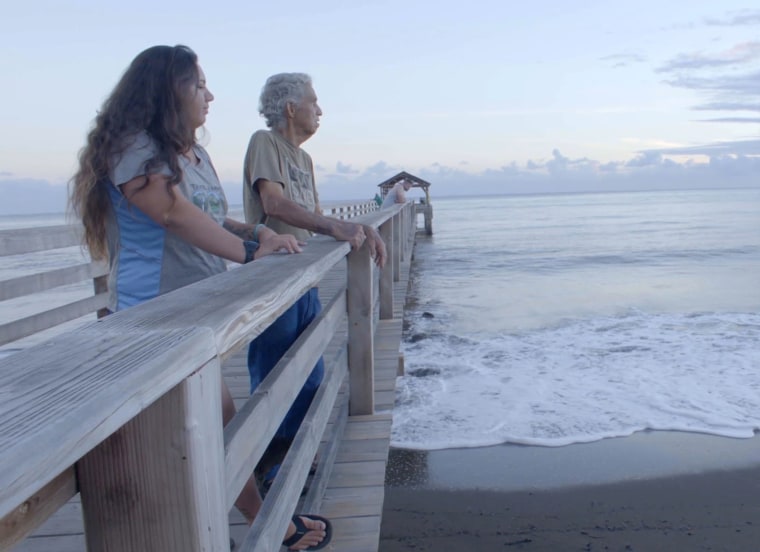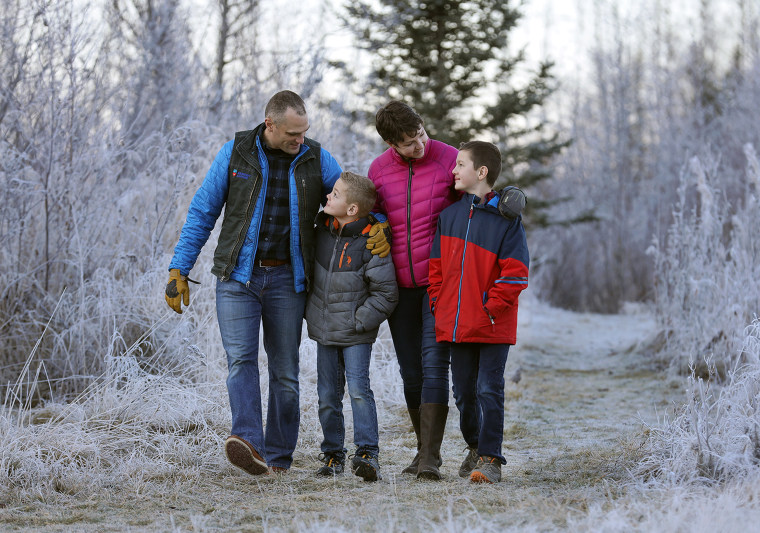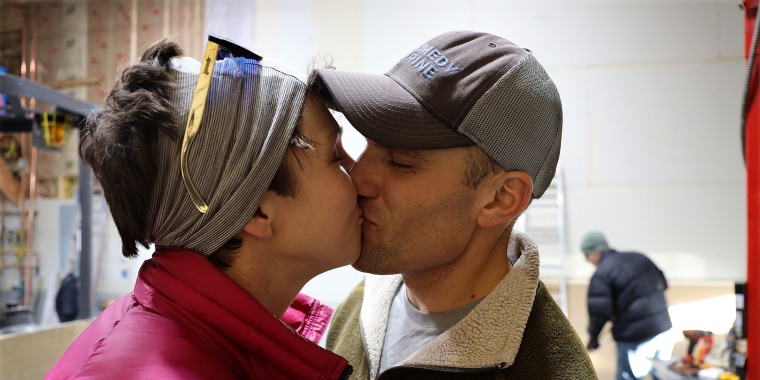A new AARP/National Alliance for Caregiving study suggests that military veterans make up a disproportionate share of the millions of Americans receiving care from family and friends, a reminder of the critical but unpaid work we honor in June, which is Alzheimer’s & Brain Awareness Month.
Twenty-six-year-old Kamaile Kapanui dreams of one day studying oceanography and setting sail on a research boat from her home in Waimea, on Hawaii’s Big Island. But for now, she’s putting those dreams on pause.
These days, Kamaile is rarely far away from home. She looks after her grandfather, Bobby Nawai, an 80-year-old Korean War veteran with Alzheimer’s. “School will always be there,” says Kamaile. “Grandpa won’t.” As Bobby’s primary caregiver, working as a deckhand on a snorkeling tour boat and hanging out with her grandfather keeps her busy enough.

Kamaile is one of the 12.4 million millennials across the U.S. taking care of a loved one at home. The Rand Corporation, a global policy research organization, estimates about 14% — around 5.5 million — of all U.S. caregivers are caring for ill or wounded veterans.
Veterans have increased rates of dementia or Alzheimer’s disease as well as post-traumatic stress disorder (PTSD), both of which are statistically more likely with traumatic brain injury (TBI). In fact, studies show that individuals with PTSD are twice as likely to develop dementia or Alzheimer’s — diseases that currently affect nearly 500,000 U.S. veterans.
In addition, people are living longer than at any other time in history. We will soon have more people to care for than caregivers. The U.S. Census Bureau points to the year 2030 as a flashpoint, in which all members of the Baby Boomer generation will be over 65 years old, and one in every five U.S. residents will be of retirement age.
Within the statistics there are individual stories and no two are alike.
The added burdens of veteran caregiving
For families of military veterans, caregiving often comes with additional sacrifice. Military caregivers, on average, care for loved ones nearly twice as many years as other families (10 years versus 5 years).
Kamaile’s younger brother Kaleo, 18, has had to pull back on his upcoming college course load to help with his grandfather. The help Kaleo provides is subtle, but crucial. For example, Kaleo sleeps in the same room as his grandfather, “Just to watch him to make sure he’s all good,” he says. “Sometimes [my grandfather] wakes up at 3 o’clock in the morning and doesn’t go back to sleep until, like, 6, so I’m up all night trying to get him to go back to sleep,” he says.
A 2018 study published in JAMA Neurology looked at 350,000 U.S. veterans who served during the wars in Iraq and Afghanistan from 2001 to 2014 and found that veterans with mild TBI have up to two times greater risk for a dementia diagnosis, and veterans who suffered a mild TBI were diagnosed with dementia 25% faster than those who did not have a TBI.
Experts already knew that moderate and severe TBI increased the risk of dementia and Alzheimer’s and led to earlier onset, but this study found that the risk also affected veterans with mild TBI, whether they lost consciousness or not. This is significant because 15% to 20% of veterans in Operation Enduring Freedom suffered at least one mild TBI from the shockwaves following an explosion and many had multiple TBIs.
The insidious nature of TBI and PTSD
Luke Bushatz, 36, was an Army Ranger for 11 years. While in Afghanistan, his vehicle was destroyed by an improvised explosive device (IED), and he was the only survivor. He returned from deployment with TBI from the explosion, which compounded his PTSD. “Like most people, I didn’t notice my symptoms,” said Luke Bushatz. “It was my family who noticed them.”
The leading symptoms of PTSD are re-experiencing trauma, emotional numbness and avoidance, and increased arousal such as anger. Bushatz is at risk for early onset dementia or Alzheimer’s.
“It kind of came in very small drops, then in a very big wave,” said Luke’s wife, Amy Bushatz. “He was obviously angry, he was obviously having some trauma, PTSD sort of symptoms, nightmares, that kind of thing. With the brain trauma, he started losing things. He would leave the stove on, just spacing out, take the kids on a walk and forget (where they'd) gone and the state trooper brought them back.”
One big lifestyle change the Bushatzes made as a family was to move. Like many veterans, Luke struggles with crowds and traffic, which is why many veterans move to sparsely populated areas.
“In 2016 we put everything on the station wagon, literally, and drove from Tennessee to Alaska,” said Amy. “We needed a fresh start. We needed to start over.” The two young Bushatz boys, David, age 10, Huck, age 7, are also part of the solution. PTSD is more common in caregiving situations with children in the home (77% versus 53% without children) as is TBI (47% versus 22%).

David and Huck understand in age-appropriate terms that their father’s brain was injured in an explosion during his military service, and how his TBI can cause him to be angry or sad — but not with them. For one of their coping strategies, they learned how to use the VA’s PTSD Family Coach mobile app as a family to help their father sort out his anger — and to calm themselves down.
Luke also leads expeditions for a Veteran Affairs program called Remedy Alpine, where he tells the other veterans gathered, “Peer relationships, supporting each other, getting into the outdoors, that’s how you heal.”
The more we know, the better care we can give
Researchers still don’t know why TBI increases the risk of dementia or Alzheimer’s. Dr. Kristina Yaffe, one of the authors of the 2018 study on TBI and dementia, told MSNBC that it could be that TBI makes the brain more vulnerable to natural aging forces or that TBI could create or accelerate the accumulation of abnormal proteins that cause damage to neurons, but more study is needed.
For families, however, the how is not as important as the why. Army veteran Tim Welbaum of Visiting Angels Senior Home Care of South Central Michigan, which is a Veteran Affairs provider that cares for many veterans, urges families to use the free resources of the Alzheimer’s Association to educate themselves and get the support they need.
Luke said that he could not go on without his family. Strengthened by their faith, Luke and his wife managed to avoid divorce when they decided to move to Alaska in 2016. They are one of the lucky couples, as statistics show that marriages of veterans with PTSD experience greater strain. “Giving up is not an option,” said his wife Amy, who describes her faith background as very strong and conservative.
For the Kapanui family in Hawaii, despite Kamaile and younger brother Kaleo’s youth, and their occasional fights with their grandfather when his temper flares, giving up is also not an option. Kamaile traces it to kuleana, the Hawaiian word for responsibility, and their love of family.
“I feel like I just got thrown right into the deep end,” said Kamaile. “It was a lot of responsibility that just got thrown onto me and my brothers, but we do it because we love Grandpa. We’ve all been through a lot, and our Grandpa is the last one that we have.”
Richard Lui is a MSNBC news anchor and a caregiver champion who is a caregiver for his father who has Alzheimer’s. Tom Riley is the president and CEO of Seniorlink, a company that offers caregiving services and support. Both are producers of "Sky Blossom", an upcoming, not-for-profit film on caregivers.

